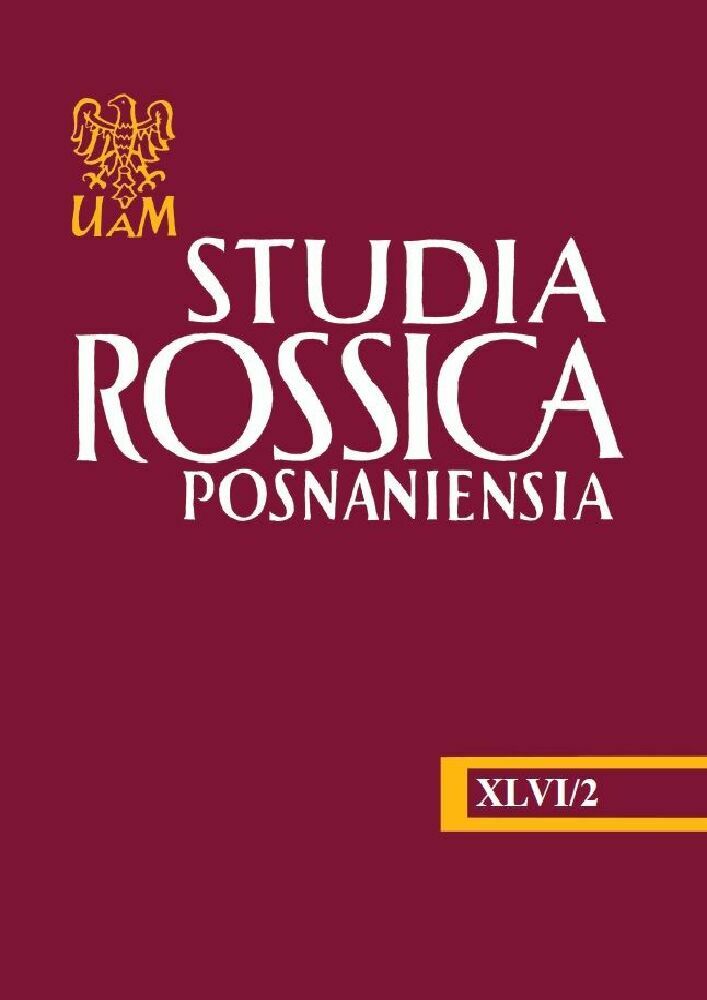Abstrakt
The subject of the article is the analysis of the image of Kiev, presented in Mikhail Bulgakov’s feuilleton Kiev, the City. This work has rarely been the subject of in-depth analysis, despite the fact that it is one of the few texts in which the writer presents the image of his hometown. A characteristic element of the description of Kiev’s past and present is the irony. It is noticeable in the title of the feuilleton, as well as in the names of its parts. The ironic image of Soviet Kiev stands in stark contrast to the vision of the city captured in the novel The White Guard. The analysis of the techniques used by the writer in the text of Kiev, the City (e.g. the naive narrator’s mask, a combination of pompous style and colloquial speech) is carried out in order to prove that the feuilleton, in its style and ideas expressed, also shows the author’s rejection of post-revolutionary reality and his attempt to overcome the trauma of the past through laughter. The ironic image of the Soviet reality on the background of eternal spiritual values makes Kiev, the City a harbinger of the problems covered in
Mikhail Bulgakov’s later works.
Bibliografia
Bulgakov, Mihail. Rannââ neizdannaâ proza. München, Verlag Otto Sagner in Kommission, 1976.
Krivošejkina, Mariâ. Žanr felʹetona v žurnalistskom tvorčestve M.A. Bulgakova: Period raboty v gazetah „Gudok” i „Nakanune”. Tverʹ, Tverskij gosudarstvennyj universitet, 2004.
Losev, Aleksej, Vâčeslav Šestakov. Istoriâ èstetičeskih kategorij. Moskva, Iskusstvo, 1965.
Olejnikov, Aleksej. Tâželaâ artilleriâ Russkoj armii v Pervoj mirovoj vojne. Web. 07.12.2019. http://www.oborona.ru/includes/periodics/armedforces/2018/0912/111125137/detail.shtml.
Petrovskij, Miron. Master i gorod: Kievskie konteksty Mihaila Bulgakova. Sankt-Peterburg, Izdatelʹstvo Ivana Limbaha, 2008.
Pohodnâ, Sofiâ. Âzykovye vidy i sredstva realizacii ironii. Kiev, Naukova dumka, 1989.
Sokolov, Boris. Bulgakov. Ènciklopediâ. Web. 07.12.2019. http://bcoreanda.com/Downloader/Dictionary/Bulgakov.pdf.
Trunin, Konstantin. M. Bulgakov. Kritika i analiz literaturnogo naslediâ. 2019. Web. 07.12.2019. https://reader.bookmate.com/YNE7WXte.
Varlamov, Aleksej. Žiznʹ zamečatelʹnyh lûdej – Bulgakov. Web. 07.12.2019. http://modernlib.net/books/varlamov_aleksey_nikolaevich/bulgakov/read.
Vvedenskij, Anton. „«Stolʹnyj gorod» v drevnerusskih i folʹklornyh istočnikah”. Slověne = Словѣ-не, 1 (3), 2014, s. 206–220.
Licencja
PRACE PUBLIKOWANE W CZASOPIŚMIE DOSTĘPNE SĄ NA LICENCJI CREATIVE COMMONS:
Uznanie autorstwa-Użycie niekomercyjne-Na tych samych warunkach 4.0 Międzynarodowe.
Autorzy tekstów przyjętych do publikacji w czasopiśmie „Studia Rossica Posnaniensia” są zobowiązani do wypełnienia, podpisania i odesłania na adres redakcji umowy o udzielenie nieodpłatnej licencji do utworów, z zobowiązaniem do udzielania sublicencji Creative Commons.
Zgodnie z umową, autorzy tekstów opublikowanych w czasopiśmie “Studia Rossica Posnaniensia” udzielają Uniwersytetowi im. Adama Mickiewicza w Poznaniu niewyłącznej i nieodpłatnej licencji oraz zezwalają na użycie sublicencji Attribution-NonCommercial-ShareAlike 4.0 International (CC BY-NC-SA 4.0).
Autorzy zachowują prawa do dalszego, swobodnego rozporządzania utworem.
Autorzy, którzy wykorzystują w swoim tekście cudze utwory (np. ilustracje, fotografie) proszeni są o dostarczenie do redakcji czasopisma zgody na publikację.
Użytkownicy internetu uprawnieni są do korzystania z utworów opublikowanych po 2015 roku “Studia Rossica Posnaniensia” tylko w celach niekomercyjnych, pod następującymi warunkami:
https://creativecommons.org/licenses/by-nc-sa/4.0/
Uniwersytet im. Adama Mickiewicza w Poznaniu zachowuje prawo do czasopisma jako całości (układ, forma graficzna, tytuł, projekt okładki, logo itp.).

